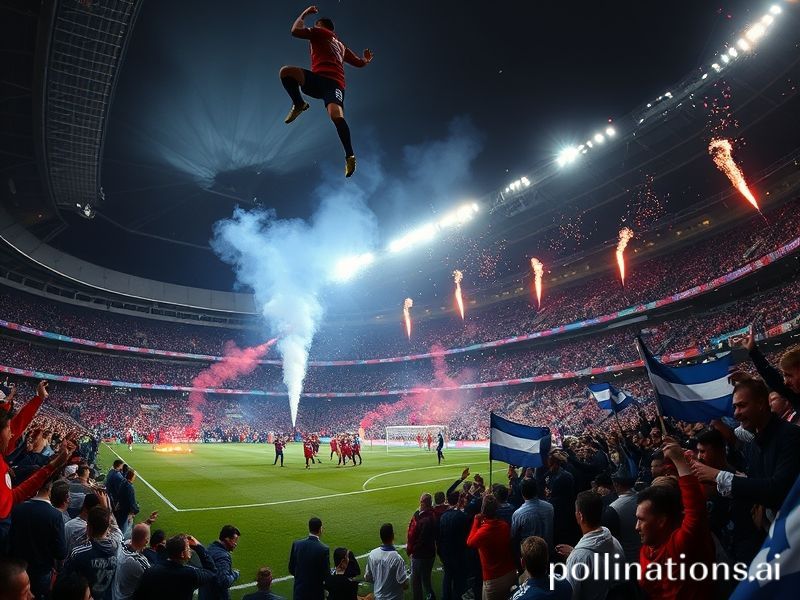Alavés vs. Sevilla: When a Forgotten La Liga Match Quietly Moves the World
Alavés vs. Sevilla: A Tiny Basque Town and Andalusia’s Orange-Blossom Aristocracy Remind the Planet Why We Still Bother With Football
By Correspondent-at-Large, still jet-lagged in Vitoria-Gasteiz
The match program handed out at Mendizorroza Stadium is printed on recycled paper, ostensibly to save the Amazon but mostly because the club’s photocopy budget was blown on a motivational speaker who once advised the Kyrgyzstan futsal team. Such is the scale of Sunday’s La Liga fixture: Alavés—population 252,000, average yearly rainfall suspiciously similar to Manchester’s self-esteem—versus Sevilla, a club so marinated in Europa League glory that UEFA briefly considered renaming the competition the “Sevilla Invitational.”
Globally, the encounter is a footnote between Champions League quarter-finals and whatever geopolitical meltdown will dominate Tuesday’s push alerts. Yet, in the same way that a bar fight in Reykjavík can crash crypto markets if the wrong oligarch’s stepson live-tweets it, Alavés–Sevilla matters precisely because nobody thinks it does.
Consider the macro lens. Viewing parties from Lagos to Lima will stream the match on pirate feeds that flicker like Cold-War radios, each buffering circle a reminder that bandwidth, like justice, is unevenly distributed. In Singapore, a hedge-fund quant will have the game on mute while he shorts Spanish construction firms; in Quito, a bus driver will bet his week’s wages on Sevilla “win to nil” because his cousin once ate tapas there. The global economy, already wobbling like a drunk linesman, absorbs these micro-wagers, and suddenly a missed penalty in the 73rd minute reverberates through offshore accounts from Grand Cayman to the Isle of Man.
Back in Vitoria-Gasteiz, the Basque Country’s separatist flags flutter beside EU banners, a marriage of convenience that resembles most modern alliances: pragmatic, slightly embarrassing, and held together by shared disdain for Madrid. Sevilla’s traveling fans, meanwhile, disembark wearing scarves the color of saffron rice and carrying plastic bags full of orange blossoms, which local customs officers eye the way TSA agents regard artisanal cheese—technically legal, but spiritually suspicious.
On the pitch, the narrative is Shakespearean if Shakespeare had been forced to write under Financial Fair Play restrictions. Alavés’ striker, a onetime Real Madrid castaway now paid in meal vouchers and exposure, chases long balls like a man trying to outrun his LinkedIn updates. Sevilla’s midfield, staffed by Argentine playmakers who speak better English than the ref, conducts triangles so geometrically pure they could be used in Euclid’s nightmares. The game ends, as these things often do, with a 1–1 scoreline that satisfies statisticians, angers purists, and allows both managers to claim moral victory in post-match pressers that sound like hostage statements.
But the final whistle is only the beginning of the global ripple. Within minutes, data farms in Iceland crunch heat maps that will decide next season’s fantasy-football valuations; in Mumbai, content farms churn out listicles (“7 Reasons Alavés’ Left-Back Is the Next Big Thing—Number 4 Will Make You Cry”). Chinese streaming platforms splice highlight reels with ads for mobile games where users can purchase virtual Luis Muriel for the price of a Beijing dumpling.
And somewhere, in a windowless UN subcommittee room, a mid-level diplomat from a country you can’t pronounce without spitting will cite the match as evidence that “even in polarized times, shared rituals promote cross-cultural understanding.” Everyone will nod, schedule another catered lunch, and forget the score by sundown.
Which, ultimately, is the point. Alavés–Sevilla is not about the destination; it’s about the absurdity of the journey—ninety minutes in which mortgages, missile crises, and melting ice caps are briefly paused so that twenty-two adults can chase a sphere stitched in Pakistan and inflated in Germany. The planet keeps spinning, the odds keep shortening, and somewhere a kid in Jakarta decides to name his firstborn Lucas Ocampos.
Football, like life, doesn’t always make sense. That’s why we keep watching.







